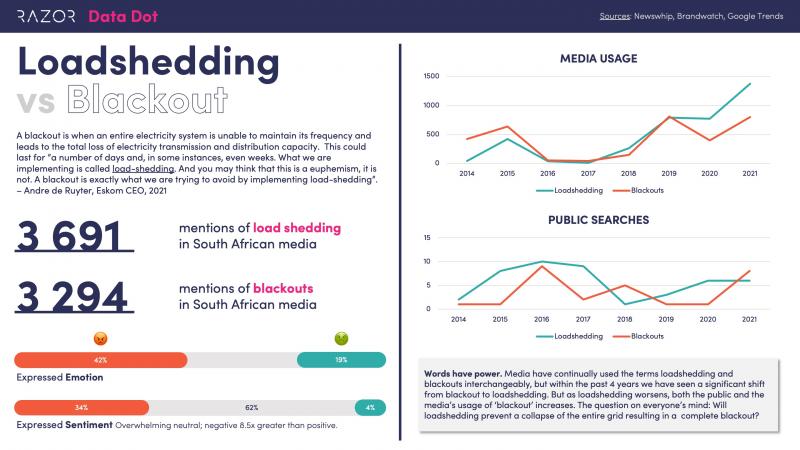
Between 1997 and 2002, South African energy provider Eskom received numerous awards. Many of these accolades recognised Eskom’s ability to produce and supply the bulk of the country with cheap electricity while expanding access to those previously denied this basic human right. Despite this performance, problems were on the horizon.
Towards the end of 1998, a White Paper on Energy Policy issued a warning that should South Africa’s economy grow at its estimated rate of 4,2% per annum, Eskom’s current generation capacity would be fully utilised by 2007. When 2007 rolled around, despite South Africa falling short of the predicted growth numbers, the White Paper’s prediction came to fruition and a new word was added to our country’s lexicon — loadshedding.
Today, loadshedding is worse than ever. After 15 years, South Africans have grown somewhat accustomed to the unpredictable nature of this pervasive problem. But one thing we haven’t been able to agree on is how we refer to it.
At Razor, we spend a lot of time talking about the words we use and don’t use to craft powerful conversation that nurture the reputations of good businesses, leaders, organisations, and causes. We believe words have power, and our choice of words matter deeply. If you change the words, you change the impact.
Despite being referred to by Eskom as ‘loadshedding’, many still opt to refer to it as a ‘blackout’. So, which one is it? In the early days of Eskom’s rotational power cuts, ‘blackout’ was the more familiar and commonly used word. But as the year’s passed, loadshedding has entered our lexicon and become part of our everyday language.
There exists a fundamental difference between the two terms. Loadshedding is what prevents a blackout. It is a preventative measure implemented to ensure the country avoids an entire collapse of the national grid. Without loadshedding, South Africans would end up with blackouts, a fate far worse than what we’ve grown familiar with.
Across South African media platforms, between 2014-2021, there were 3 294 mentions of blackouts compared to 3 691 mentions of loadshedding. While the difference between these figures is somewhat negligible, there has been an overall shift in the media’s reference to ‘loadshedding’ to describe the now-familiar crisis more accurately.
Over the past four years, the media has used the term blackouts significantly less, favouring ‘loadshedding’ when reporting about the energy crisis. An interesting contrast to this trend is how, from a public perspective, the opposite is true with search results shifting more towards the use of the term ‘blackout’. As loadshedding worsens, this statistic could point to the public trying to properly understand the difference between loadshedding and blackouts. What is certain is the overall tone of conversation and coverage, which remains extensively negative. By the numbers, negative sentiment is more than eight times greater than positive across social platforms.
While daily power cuts are an everyday reality in South Africa, we are increasingly seeing similar issues across the globe in Australia, Taiwan, the UK and even certain parts of America.
As the world grows familiar with this new reality, South Africans ask burning question that doesn’t have definitive answer yet: will loadshedding continue to prevent a collapse of the entire grid, ultimately saving South African from a complete national blackout?
Razor PR is the strategic communications consultancy of the M&C Saatchi Group South Africa. In 2021, they were awarded Global New Consultancy of the Year at the Sabre Awards. In 2022, they are the most awarded agency in Africa at the Sabre Awards and named African Agency of the Year. Recently Razor has been shortlisted as Global Corporate PR Agency of the Year by Provoke.
